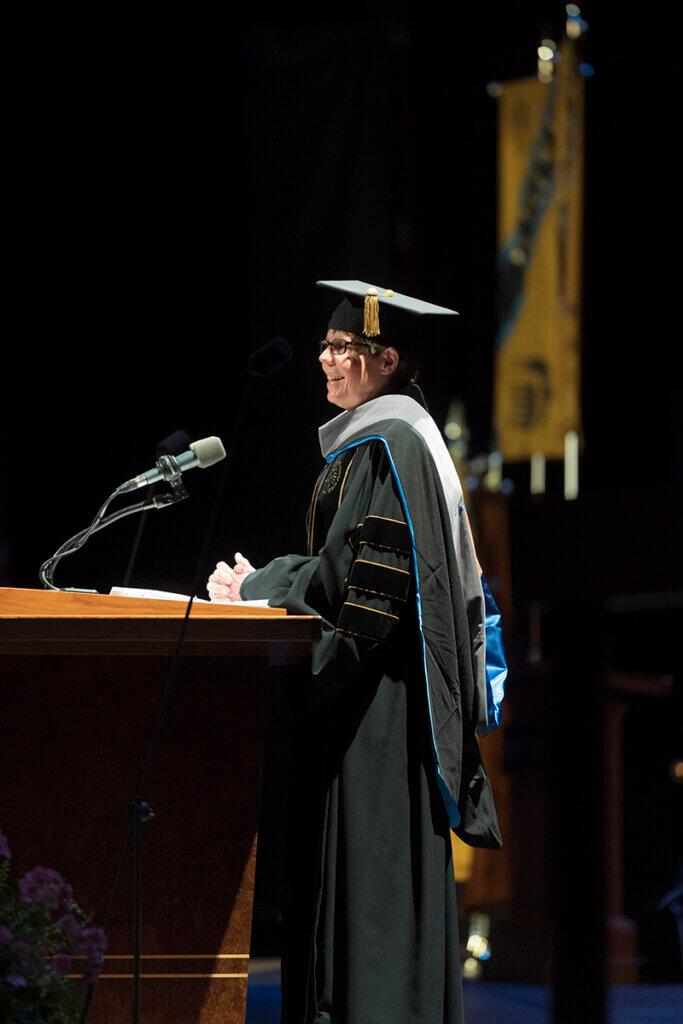When Purdue University needed a guest speaker for the Graduate School Commencement Ceremony to address master’s and Doctor of Philosophy degree recipients in May, the obvious question became, who better than Dr. Deborah Knapp, Distinguished Professor of Comparative Oncology in the College of Veterinary Medicine? As explained in her introduction in the Purdue 2022 Commencement Program, “Dr. Knapp is nationally and internationally recognized for her work in bladder cancer and comparative oncology.” Her personal story of growing into the role of a premier cancer researcher, and the insights she’s gleaned along the way, provided just the right inspiration for Purdue students earning their graduate degrees.
So on May 16, Dr. Knapp stepped to the podium in the Elliott Hall of Music after being introduced by Provost Jay Akridge as the guest speaker for the Seventh Division Commencement Ceremony. It was a well-earned moment in the spotlight for Dr. Knapp that also reflected well on the College of Veterinary Medicine.
Dr. Knapp has served on the college’s faculty since 1990 and holds a named professorship as the Dolores L. McCall Professor of Comparative Oncology. She also is the director of the Purdue Comparative Oncology Program and is a co-program leader in the Purdue University Center for Cancer Research. After receiving her Bachelor of Science degree from North Carolina State University, Dr. Knapp earned her DVM degree at Auburn University and then came to Purdue to complete a Veterinary Medical Oncology Residency, as well as post-doctoral research in cancer pharmacology and tumor immunology, before joining the college’s faculty.

“Congratulations to all of you who are earning graduate degrees today,” Dr. Knapp said as she began her remarks to the new graduates at the commencement ceremony. “You have worked hard, persevered, and excelled, and your achievements are exemplary. You have joined the fewer than 13 percent of people in the U.S. who have earned master’s degrees, or the less than two percent who hold doctoral degrees.” She also reminded them, these are not just any graduate degrees, they are degrees from Purdue University, “… one of the finest institutions of higher education in the world.”
But Dr. Knapp wasn’t there to just give the new grads a pat on the back. In her characteristically gentle and unassuming way, she next offered a bold challenge. “Celebrate your graduation today, and then tomorrow, let’s get to work.” From Dr. Knapp’s vantage point the need is that great – there’s no time to waste. “There has never been a time in history when there have been as many deep and complex challenges as those we are facing in the world today, some that threaten our very existence,” Dr. Knapp said. “Whether that be conflicts and war on multiple continents, disease, hunger, climate change, societal problems, or rampant misinformation… The world is not in the place we want and need for it to be.”
Despite that stark assessment, Dr. Knapp went on to offer two reasons why she is not overly discouraged. “First, all around me I see people from all walks of life stepping up to make a positive change, whether that be many people doing small acts, or occasionally a few doing larger acts,” Dr. Knapp said. “Second, I am standing here looking out at your graduating class knowing that you hold many of the keys for a better future! Your class surpasses any before you in the knowledge and technologies available to you. This, combined with your individual abilities, talents, and commitment, will empower you to improve the world!”
Dr. Knapp then offered food for thought centered around four key points. First, she encouraged the new graduates to look for opportunities and create opportunities to do what matters the most, to tackle the most serious and pressing problems in the world. “Try to remember that life is not about what you get, life is about what you give. Try to carve out time every day to do what matters the most, and this applies to your career and your personal life.”
Secondly, she encouraged the graduates to go beyond their training and their discipline. “Do not be held back by what you did not learn in school,” Dr. Knapp advised. “The degree you have earned has given you a foundation of knowledge and the skills to acquire more knowledge, and it has made you a critical thinker, and perhaps most importantly, a problem solver. You can apply these skills to solve many different challenges.”
Dr. Knapp then recalled her own experience as a faculty member in the College of Veterinary Medicine. “My highest degree, Doctor of Veterinary Medicine, prepared me to be a primary care veterinarian. But, it did not stop me from creating a new path. It gave me the foundation to act on a very unexpected, but critically important observation in the clinics,” Dr. Knapp explained. “Briefly, we noted dramatic cancer regression in dogs when the only drug they were receiving was an arthritis drug for pain relief. Two of those dogs were my pet dogs. That observation and the follow-up research has led to one of the most widely used cancer treatments in pet dogs worldwide.” Dr. Knapp further explained, “Along the way, I was given the opportunity to learn about drug chemistry, clinical trial design, and mechanisms of action of the drug including some very intriguing immunological effects. It went beyond dogs into planning and securing funding for a human clinical trial, and the parallel mechanistic work in our lab.” Dr. Knapp added, “This was possible because I had the chance to go beyond my formal education, and to be part of a highly effective team of people with complementary expertise.”
Dr. Knapp’s third point involved admonishing the graduates to be willing to change their careers if the indication arises, even though it may be frightening to do so. “Maybe there is a more pressing problem that you can contribute to solving. Or maybe, like me, in time you may discover that you worked very hard over a number of years with a specific career in mind, only to decide you want something different.” Noting that throughout history, some of the most important advances have come from people willing to change their careers, Dr. Knapp cited several examples including Bertha von Suttner, from Austria, who became the first woman to win the Nobel peace prize after she moved on from being a secretary, housekeeper, tutor, and failed opera singer. Another example she shared was that of Karl Starzl, who grew up in Iowa planning to become a priest, but, when his mother developed breast cancer, changed his mind and went to medical school and earned a PhD in neurophysiology. Dr. Knapp described how, with his keen interest in liver physiology and his surgical skills, he became an early pioneer in liver transplantation and went on to be the “father of modern organ transplantation.”
Dr. Knapp concluded with her fourth point, challenging the graduates to seek out, and follow science and truth. “The amount of misinformation and the acceptance of erroneous information as truth is incredibly disturbing and, in many instances, it is outright dangerous,” Dr. Knapp said. “From my angle in medicine, I see people acting on erroneous information every day, not just in themselves, but related to the health of their pets. And, misinformation goes far beyond medicine. So, every chance you have, seek out the facts to understand the situation and how to respond.” And she added, “when you do respond, please do so with respect, professionalism, and integrity, and of course in a non-violent manner.”
Dr. Knapp closed by advising the new graduates to “… take the opportunity to be a leader for positive change.” Then, she reiterated the charge she began with. “Do celebrate today – you deserve it! And then, please, all of you, let’s get to work. Step up and take your place in changing the world for good.”
The Graduate School commencement ceremony was one of a total of seven May commencement ceremonies held in the Elliott Hall of Music. A total of more than 8,100 Purdue students were eligible to participate, including 1,180 master’s and 454 Doctor of Philosophy degree candidates. Click here to access recordings of each of the ceremonies. Click here to view the Graduate School ceremony and Dr. Knapp’s remarks.

